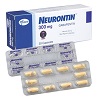 Pill Categories
Pill Categories
Neurontin
 |
Neurontin are an anticonvulsant used for treating seizures associated with epilepsy. It may also be used for treating nerve pain associated with herpes zoster (shingles) infection (postherpetic neuralgia). |
PRODUCT DESCRIPTION, SAFETY, ETC View product image
Neurontin 800 mg
Neurontin 600 mg
Neurontin 400 mg
Neurontin 300 mg
Neurontin 100 mg
| Package | Price | Per pill | Save | Order |
|---|---|---|---|---|
| 270 pills - 100 mg | $221.79 | $0.82 | $97.19 |  |
| 180 pills - 100 mg | $155.90 | $0.86 | $56.75 |  |
| 90 pills - 100 mg | $91.78 | $1.02 | $14.54 |  |
| 60 pills - 100 mg | $70.88 | $1.19 | — |  |

PRODUCT DESCRIPTION
Drug title
Neurontin (Gabapentin)
Application
Neurontin are an anticonvulsant used for treating seizures associated with epilepsy. It may also be used for treating nerve pain associated with herpes zoster (shingles) infection (postherpetic neuralgia).
Application method
Use Neurontin as prescribed by your doctor. Follow the instructions on the package.
Take Neurontin inside while eating or after the meal.
Do not take antacids, containing aluminum or magnesium within 2 hours before taking Neurontin.
Do not stop taking Neurontin immediately. You can increase the risk of side effects (for example, seizures). If you need to stop taking Neurontin or to add a new medicine, your doctor will gradually reduce the dose.
The mechanism of action
Neurontin is an anticonvulsant agent. It is unknown how it works to prevent seizures and nerve pain.
Missed dose
If you miss a dose of Neurontin then you may take it as soon as you remember and adjust the remaining doses accordingly. However, if it is nearly time for the next dose then you may skip this dose and continue with the regular dosage. Do not take a double dose to make up for the missed dose.
Keeping
Keep it at room temperature (77 degrees Fahrenheit or 25 degrees C) in a protected place away from light and moisture. No long-term storage between 59-86 degrees F (15-30 degrees C) is allowed. Do not store it in the bathroom. Keep medicines away from children and pets.
Overdose
A Neurontin overdose may show symptoms like diarrhea, double vision, drowsiness, lethargy, slurred speech. Seek medical attention immediately if you suspect an overdose.
Precautionary measures
Discuss with your doctor about any prior medical condition that you may have including allergies to medicines, food or other substances, if you have kidney problems and are on dialysis.
Neurontin may cause drowsiness. These effects get aggravated if you take it with alcohol or certain other medications (sleep aids, muscle relaxers). So, do not drive or perform other potentially hazardous tasks until you know how your body reacts to the drug.
You must not take Neurontin if you are allergic to any ingredient in it.
If you are pregnant or suspect that you are, then stop using Neurontin and contact your doctor immediately.
It is unknown whether Neurontin is secreted in breast milk. Avoid breast feeding while using the drug.
Certain drugs can interact with Neurontin and hence, mention clearly to your doctor or pharmacist all medicines, dietary supplements and herbal prescriptions that you are taking.
Neurontin may affect your blood sugar level. If you are a diabetic, then constant blood sugar monitoring is a must. Contact your doctor immediately if these symptoms occur.
Neurontin should not be used in children younger than 3 years of age as the safety and effectiveness of the drug have not been confirmed yet.
It also causes emotional or behavioral side effects in children 3 to 12 years of age. Report emotional "swings", hostile or aggressive behavior, problems concentrating, decreased performance at school, an increase in restlessness or hyperactivity to your doctor.
Ensure that you inform your doctor and your dentist about Neurontin before receiving any form of medical treatment or dental treatment or emergency surgery.
Periodic lab tests including liver function, kidney function, and complete blood cell counts may be recommended to monitor your health while taking the drug. Ensure that you do not miss any lab tests.
It has been noted that elderly patients are more sensitive to the side effects of the drug. They might need a dosage adjustment or special monitoring throughout the treatment.
Side effects
Some of the common side effects of are back pain, changes in vision (double or blurred vision), clumsiness, constipation, diarrhea, dizziness, drowsiness, dry mouth, nausea, stomach upset, tiredness, vomiting, and weight gain. Please contact your doctor if the symptoms persist or become bothersome.
Other severe side effects include allergic reactions (rash, hives, itching, difficulty breathing, tightness in the chest, swelling of the mouth, face, lips, or tongue), abnormal thoughts, aggressive behavior, back and forth eye movements, behavioural problems, change in school performance, chest pain, confusion, fainting, fast, slow, or irregular heartbeat, fever, chills, or sore throat, hostility, hyperactivity, loss of coordination, memory loss, mood swings, numbness of an arm or leg, one–sided weakness, restlessness, seizures, severe headache or dizziness, shortness of breath, speech changes, swelling of the hands, legs, or feet, tremor, trouble concentrating, twitching.
You must seek medical attention immediately if any of these side effects occur
Additional information
If you have any questions concerning Neurontin, please consult your doctor.
If symptoms do not improve or become worse, consult your doctor.
| Home Contact us Delivery Control Discounts Sitemap | Terms of service | Money back policy | Privacy policy |








 Live Chat 24/7
Live Chat 24/7





